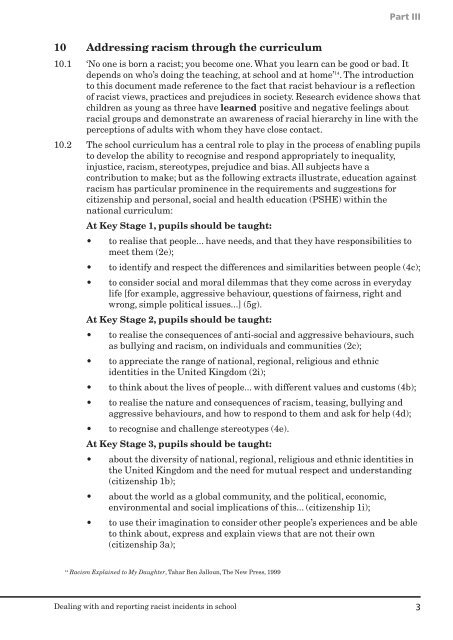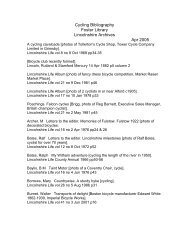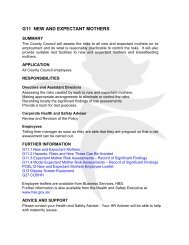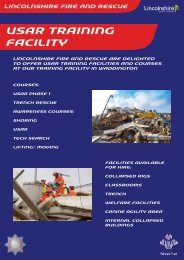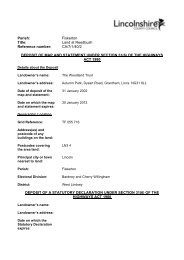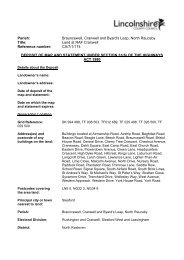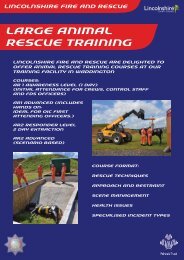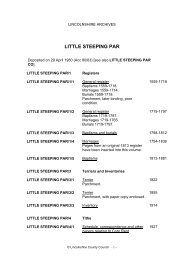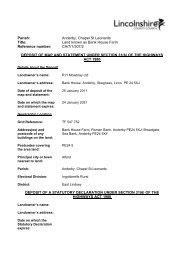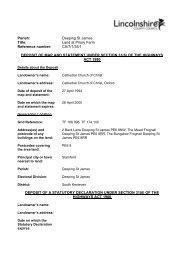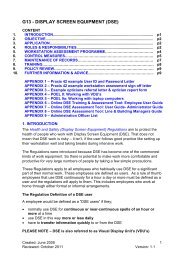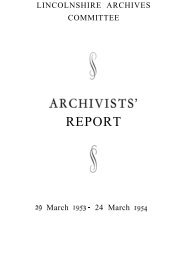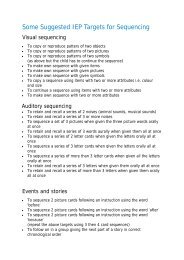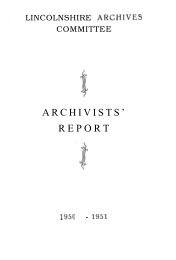Dealing with and reporting racist incidents in school - Lincolnshire ...
Dealing with and reporting racist incidents in school - Lincolnshire ...
Dealing with and reporting racist incidents in school - Lincolnshire ...
Create successful ePaper yourself
Turn your PDF publications into a flip-book with our unique Google optimized e-Paper software.
10 Address<strong>in</strong>g racism through the curriculum<br />
10.1 ‘No one is born a <strong>racist</strong>; you become one. What you learn can be good or bad. It<br />
depends on who’s do<strong>in</strong>g the teach<strong>in</strong>g, at <strong>school</strong> <strong>and</strong> at home’ 14 . The <strong>in</strong>troduction<br />
to this document made reference to the fact that <strong>racist</strong> behaviour is a reflection<br />
of <strong>racist</strong> views, practices <strong>and</strong> prejudices <strong>in</strong> society. Research evidence shows that<br />
children as young as three have learned positive <strong>and</strong> negative feel<strong>in</strong>gs about<br />
racial groups <strong>and</strong> demonstrate an awareness of racial hierarchy <strong>in</strong> l<strong>in</strong>e <strong>with</strong> the<br />
perceptions of adults <strong>with</strong> whom they have close contact.<br />
10.2 The <strong>school</strong> curriculum has a central role to play <strong>in</strong> the process of enabl<strong>in</strong>g pupils<br />
to develop the ability to recognise <strong>and</strong> respond appropriately to <strong>in</strong>equality,<br />
<strong>in</strong>justice, racism, stereotypes, prejudice <strong>and</strong> bias. All subjects have a<br />
contribution to make; but as the follow<strong>in</strong>g extracts illustrate, education aga<strong>in</strong>st<br />
racism has particular prom<strong>in</strong>ence <strong>in</strong> the requirements <strong>and</strong> suggestions for<br />
citizenship <strong>and</strong> personal, social <strong>and</strong> health education (PSHE) <strong>with</strong><strong>in</strong> the<br />
national curriculum:<br />
At Key Stage 1, pupils should be taught:<br />
• to realise that people... have needs, <strong>and</strong> that they have responsibilities to<br />
meet them (2e);<br />
• to identify <strong>and</strong> respect the differences <strong>and</strong> similarities between people (4c);<br />
• to consider social <strong>and</strong> moral dilemmas that they come across <strong>in</strong> everyday<br />
life [for example, aggressive behaviour, questions of fairness, right <strong>and</strong><br />
wrong, simple political issues...] (5g).<br />
At Key Stage 2, pupils should be taught:<br />
• to realise the consequences of anti-social <strong>and</strong> aggressive behaviours, such<br />
as bully<strong>in</strong>g <strong>and</strong> racism, on <strong>in</strong>dividuals <strong>and</strong> communities (2c);<br />
• to appreciate the range of national, regional, religious <strong>and</strong> ethnic<br />
identities <strong>in</strong> the United K<strong>in</strong>gdom (2i);<br />
• to th<strong>in</strong>k about the lives of people... <strong>with</strong> different values <strong>and</strong> customs (4b);<br />
• to realise the nature <strong>and</strong> consequences of racism, teas<strong>in</strong>g, bully<strong>in</strong>g <strong>and</strong><br />
aggressive behaviours, <strong>and</strong> how to respond to them <strong>and</strong> ask for help (4d);<br />
• to recognise <strong>and</strong> challenge stereotypes (4e).<br />
At Key Stage 3, pupils should be taught:<br />
• about the diversity of national, regional, religious <strong>and</strong> ethnic identities <strong>in</strong><br />
the United K<strong>in</strong>gdom <strong>and</strong> the need for mutual respect <strong>and</strong> underst<strong>and</strong><strong>in</strong>g<br />
(citizenship 1b);<br />
• about the world as a global community, <strong>and</strong> the political, economic,<br />
environmental <strong>and</strong> social implications of this... (citizenship 1i);<br />
• to use their imag<strong>in</strong>ation to consider other people’s experiences <strong>and</strong> be able<br />
to th<strong>in</strong>k about, express <strong>and</strong> expla<strong>in</strong> views that are not their own<br />
(citizenship 3a);<br />
14 Racism Expla<strong>in</strong>ed to My Daughter, Tahar Ben Jalloun, The New Press, 1999<br />
<strong>Deal<strong>in</strong>g</strong> <strong>with</strong> <strong>and</strong> <strong>report<strong>in</strong>g</strong> <strong>racist</strong> <strong><strong>in</strong>cidents</strong> <strong>in</strong> <strong>school</strong><br />
Part III<br />
3


